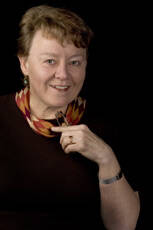Will there be reading in heaven? This question came to mind one morning as I walked to work, thankful for the enduring gifts I’ve received from teachers. Among those gifts, a love of reading stood out like a skyscraper in a neighborhood of brownstones.
I am not sure when or how I learned to read. I recall at age 3 waiting for a neighbor lady to read me my favorite book, one of the many I had memorized. The breakthrough to reading likely came a year later when my brother started first grade, and his learning to read and write proved contagious.
The teachers at public school read aloud at storytime, a magical period that I loved, though my enthusiasm could be disruptive. During a reading of Raggedy Ann and Raggedy Andy, I once fell into such giggles that I couldn’t even stand up to leave the room and had to be carried bodily out into the hall to recover myself. What tickled me was a character who said the opposite of what he meant to say. “Opposite”—what a conceptual revelation!
A fifth-grade teacher read a chapter a day from children’s classics like Follow My Leader and The Wheel on the School. Despite such encouragement, I seldom read outside the classroom until seventh grade. That year my homeroom teacher was a book addict. He wrote class assignments on the blackboard, then sat in the last row and read for hours, absorbed. Not the best teacher, you might think. Yet his habit intrigued me. What did books contain that could grab you and not let go? To find out, I began to read in earnest and discovered biography (George Washington Carver), autobiography (Benjamin Franklin) and the Bible. I was hooked.
Reading has literally changed my life: A book about Koinonia Farm wooed me to South Georgia in the late 1970s to experience the ecumenical Christian community for myself; dozens of books by Thomas Merton helped usher me—and thousands of others—into the Catholic Church; reading and writing became my vocation. Over a lifetime I have spent more money on bookshelves than on cars. And my retirement dreams include time for leisurely read-a-thons. Will I be finished reading when my final bell is rung? Doubt led me to ask about reading in heaven. Being a reader means leading a privileged life, even though the gift comes with responsibilities.
While reading is a private pleasure, it is also a social force with global consequences. The written word probes the depths of the human heart and mind: its aspirations, delights, disappointments and perversions. The word can transport us, and when it does, the destination matters. Consider the Bible and the Koran, Plato’s Republic, the works of William Shakespeare, the Declaration of Independence and Uncle Tom’s Cabin and where those have led individuals and societies. Think of Das Kapital, Quotations From Chairman Mao and Mein Kampf and where they have led. After World War II observers expressed shock that neither German high culture nor its Christian faith prevented the Nazis from drawing ordinary citizens into acts of appalling inhumanity. Truth is, we bear responsibility for what we read and write and ascribe to. Where does our reading lead?
It is easier to trace the opposite route: where illiteracy leads. Illiteracy still stalks the globe, disproportionately among women. Tyrants use it to isolate, impoverish and enslave. In my book, literacy is a human right that should be promoted as such. Yet it is also a fragile undertaking that a natural disaster, a tribal conflict or a war can set back for a generation. Here’s the irony: Readers wonder if there will be reading in heaven, while those bound by illiteracy could experience some heaven on earth if only they could read.








